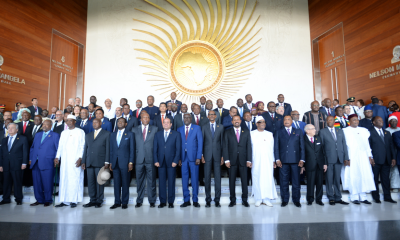Health
PharmAccess, Sanofi and CarePay partner to digitize diabetes and hypertension care in Kenya

An innovative pilot that will empower patients to access affordable and quality NCD care with a mobile phone and offers healthcare financing stakeholders a potentially scalable and efficient service model.
PharmAccess, CarePay and Sanofi have announced a new partnership, Ngao Ya Afya (“Shield for Health”). Ngao Ya Afya aims to facilitate access to better diabetes and hypertension care in Kenya through a low cost, mobile technology enabled model. The partnership is committed to advancing patient access to care and testing new solutions to support government and private payers address healthcare affordability and financing challenges.
Non-Communicable Diseases (NCDs) are the leading cause of death globally, killing 41 million people each year, equivalent to 71% of all deaths globally . NCDs account for 27% of the total deaths and over 50% of total hospital admissions in Kenya . The highest risks of dying from NCDs are in low and middle-income countries (LMIC) – especially sub-Saharan Africa – with 85% of these deaths occurring in LMICs. Worldwide these countries are struggling to scale up NCD response due to lack of funding, staff and infrastructure. This program aims to use mobile technology to show how access to diabetes and hypertension care for individuals and their families across some of the most deprived regions can be increased.
(Dr. Loise Nyanjau, Cardiovascular Focal Point, NCD Unit, Ministry of Health Kenya & Dr. Eva Njenga, Chair NCD Alliance Kenya)
At the core of Ngao Ya Afya is M-TIBA, a health finance platform, integrating payments and transforming health schemes to drive healthcare inclusion. Funds on M-TIBA are specifically dedicated for healthcare and can only be used to pay for selected health schemes and services at accredited healthcare facilities. Over one million Kenyans have registered on M-TIBA through a range of healthcare insurance, savings and donor-funded programs. The rapid growth of M-TIBA in under 2 years is unprecedented in the African healthcare landscape.
This program aims to use the platform to scale-up access to NCD care for individuals and their families – particularly among vulnerable families. The partners have designed a comprehensive service and finance package for diabetes and hypertension care that will be tested as a pilot in Kenya. It will roll out in three health facilities that are part of the M-TIBA network – reaching around 500 diabetes and hypertension patients and running until the end of 2019.
M-TIBA will provide security and transparency for transactions conducted under the program. The doctors as well as other partners will have continuous insight into how the funds are being spent and on what kinds of care. These insights will be used to improve access, efficiency and quality in diabetes and hypertension care.
Commenting on the announcement, Isaiah Okoth, PharmAccess Kenya Country Director said, “Mobile solutions are crucial for scale up of NCD care in Kenya and low-middle income countries generally – especially in sub-Saharan Africa. With this project, we hope to develop scalable, low cost quality service that that gives people in need access to care and empowers patients to take charge of their own health.”
Jon Fairest, Head of Sanofi in Africa, said, “Non-communicable diseases are a growing burden in Kenya and in Africa. To be able to address this situation we need to create an ecosystem of partnership and develop innovative and sustainable care model for the sake of patients.
Ngao Ya Afya is a good example of collaboration using mobile phones to provide services for patients. We look forward to engaging with government, private payers and other stakeholders to make Ngao Ya Afya sustainable in Kenya.”
Kees Van Lede, CEO, Carepay says, “You can see the devastating effect of NCDs on many families in Kenya, as care drains scarce resources and impacts on the future prospects of the whole family. M-TIBA enables direct targeting of groups that need support the most. The insights into healthcare usage and the quality of delivery are critical for designing effective and long-lasting solutions.”
In addition, PharmAccess works closely with sister organization the Joep Lange Institute, which is also providing consultative expertise on this project.
-PharmAccess Foundation
Health
Inaugural Pan-African Nutrition and Health Summit set to shape a healthier continent

The inaugural edition of Africa’s Nutrition and Health Summit is set to convene on November 16, 2024, bringing together an extensive network of healthcare practitioners, nutrition experts, agricultural stakeholders, policymakers, and influential leaders from all over the continent under the theme, ” Soil to Wellness: Shaping a United Approach to Africa’s Health.” This groundbreaking summit aims to address the critical rise of non-communicable diseases (NCDs) across Africa through integrative approaches to preventive health, nutrition, and sustainable lifestyle practices.
This movement would explore holistic and practical solutions that unite stakeholders along the health and nutrition value chain, with a critical focus on how surging rates of NCDs like diabetes, hypertension, and obesity can be curbed via sustainable agriculture, improved food quality, and healthier lifestyle choices, to reshape our food and lifestyle culture, thereby laying a foundation for better health outcomes, for generations to come.
A Key Focus on Nutrition and Lifestyle Practices
The summit’s agenda will include panels on integrative approaches to nutrition and preventive health, the dual burdens of malnutrition and obesity, the impact of digital health in preventing diet-related diseases, and the role of sustainable agriculture in food quality. Our holistic approach strives to demonstrate how Africa’s diverse and rich agricultural resources can play a pivotal role in ensuring food security, balanced nutrition, and wellness for all citizens.
Call to Action
The inaugural edition of ANHS is especially relevant to anyone invested in the long-term health and wellness of the African continent. Such stakeholders are not limited to health professionals, nutrition experts, agricultural stakeholders, policy influencers, researchers, food producers, and processors. It is indeed a legacy-defining opening for businesses and community leaders interested in leaving their prints in the sands of policies that would advance health and wellness on the continent.
Participants will gain insights from leading experts and join the cause to champion Africa’s health by focusing on the most essential aspects of disease prevention and overall wellness. Now, more than ever, it is crucial to prioritize wellness at the societal level, addressing the connections between soil health, food quality, and sustainable practices that contribute directly or indirectly to healthy living.
Join us at the inaugural edition of Africa’s Nutrition and Health Summit on November 16, 2024, as we unite to shape a healthier continent – one that intentionally harnesses her resources and expertise to combat non-communicable diseases.
Register here to attend ANHS 2024
For more information, press inquiries, or partnership opportunities, please contact:
RSB
Official Branding Partner of ANHS
Health
Dr. Jesupelumi Adenihun: Adopting a lifestyle of sustainable health practices with food

Dr. Jesupelumi O. Adenihun (Image: Supplied)
You have likely heard the saying, “You are what you eat,” and it couldn’t be truer. What we consume plays a far greater role in our health than many of us realize. Over time, our eating habits can either support our body’s natural healing processes, leading to improved health and vitality, or contribute to nutrient deficiencies, inflammation, and even chronic diseases.
What this means is, our eating habits over time sets off a series of chain reactions in our bodies that impact our overall well-being. The good news, however, is that by consistently making the right food choices, we can put ourselves on the path to a state of good health and well-being. While this might sound daunting at first, it is often the small, consistent actions that yield the best results. Let’s take a look at 10 simple but effective habits you can begin to cultivate for better health and adopt as lifestyle practices:
- Substitute soda with water: No beverage is more refreshing or beneficial than plain water. It hydrates, cleanses, and confers numerous health benefits.
- Snack on nuts and seeds: When you are craving a snack, go for nuts or seeds, unless you have an allergy. They are nutrient-dense and can also be satisfying.
- Opt for grilled or baked over fried: Choosing grilled or baked foods helps reduce unhealthy fat intake without compromising on flavor. This also helps reduce the risk of developing high cholesterol levels which is a cardiovascular risk.
- Enjoy homemade smoothies over sugary drinks: When time permits, make homemade smoothies making use of reliable recipes. If you are short on time, consider vendors who provide fresh, nutrient-packed options.
- Practice mindful eating: Mindful eating means being fully present during meals, savoring each bite, and listening to your body’s signals. Eating mindfully is a game changer for a lot of people.
- Be well-informed about what you consume: Whether it’s food or drinks, it is essential that you stay conscious of what’s in your food and drinks. Many packaged products contain hidden sugars that the body doesn’t exactly need. Always take a moment to check the ingredients.
- Add more vegetables to your plate: Think beyond the usual veggies—some varieties exist which also depends on your geographical location. Be open and willing to explore new options and add color to your meals.
- Prioritize lean proteins: Not all proteins are created equal. Make lean protein choices and consider plant-based options to support your overall health.
- Use natural spices over salt-laden seasonings: High salt intake is known to be a contributor to heart-related conditions like hypertension. Opt for natural herbs and spices to add flavor without carrying on health risks.
- Stay physically active: Find an activity you enjoy and can commit to, whether you are at home or on the go. Consistency is key. Also seek the counsel of a coach if you need to.
Remember, true wealth lies in your health. Let each meal choice you make be a step toward a healthier, more vibrant life. Eat to wealth, health is wealth.
Written By: Dr. Jesupelumi O. Adenihun (Nutrition Coach, Preventive health care specialist).
Health
Bridging The Gap Between Menstrual Health and Mental Health in Africa

Menstrual health is not just about periods; it’s about breaking the cycle of exclusion and empowering the future of Africa – one girl at a time.
Empowering women and girls who menstruate worldwide starts with breaking the silence around periods. Eno, a 14-year-old girl from a remote community in the south, shrinks when her period arrives each month. Shame and fear are a constant part of her experience. “At school, whispers follow me. They call me ‘dirty’ because I can’t afford pads. I use the white piece of cloth my mother gave me and the extra layer of pad I had sewn on our neighbor’s machine using pieces from his shop.” Eno’s story, though heartbreaking, is far from unique. Across Africa, millions of girls and women face a hidden crisis: period poverty.
Period poverty refers to the inability to afford and access menstrual products, sanitation and hygiene facilities, and education and awareness to manage menstrual health. Globally, more than two billion people around the world menstruate monthly.
Menstruation, a healthy and natural biological process continues to be shrouded in silence and stigma across many parts of Africa. This silence perpetuates a cycle of neglect and exclusion, where the menstrual health needs of women and girls are ignored, leading to significant physical and mental health issues.
Daily, women and girls are unable to afford sanitary pads, forcing them to resort to unhygienic alternatives like old rags, leaves, old clothes, cotton wool, toilet paper, newspaper, and make-shift hygienic pads. This lack of access not only affects their physical health but also their mental well-being, as they experience anxiety, shame, and isolation during their menstrual cycles. With limited to no access to safe water and sanitation to manage their menstrual health and hygiene, these women and girls who cannot afford menstrual products do not live well within their rights and freedoms as their menses interrupt their day-to-day flow.
Human-Centered Stories
To truly understand the impact, we must listen to the voices of those affected. Nike, a 15-year-old girl from a rural community in Ogun State shared, “I have to stay home when I have my period because I don’t have pads. I miss out on school and feel ashamed.” Rukkayat, another young woman from a community in Abuja stated, “The stigma around menstruation is so strong that I can’t even talk to my teachers about it. It feels like a dirty secret. I feel dirty walking around my school. So, I’d rather stay at home when I’m on my menses to endure the pain and take care of myself.” These anonymous quotes reflect a common reality for many girls and women across Africa, highlighting the urgent need for change.
Addressing Stigmas and Period Poverty
Period poverty stems from persistent stigmas around menstruation. These stigmas include the belief that menstruating women are impure, leading to their exclusion from everyday activities and social interactions. Such beliefs not only undermine women’s confidence but also reinforce gender inequality. Periods, already a source of physical discomfort, become a breeding ground for anxiety, shame, and isolation. This can lead to depression, decreased self-esteem, and a reluctance to seek help. The link between menstrual health and mental health is undeniable.
To combat these stigmas, sensitization initiatives, and project outreaches need to provide menstrual products and education. These programs will empower girls with knowledge and resources, breaking the silence and changing societal attitudes toward menstruation.
Breaking the Cycle: Investing in Solutions, Empowering Futures
So, how can we bridge the gap between menstrual health and mental health by showing one can’t do without the other? By recognizing that menstrual health is intrinsically linked to mental well-being, we can create holistic approaches that address both.
- Combat Stigma Through Education: Open conversations are key. Educational programs that address menstrual hygiene and dispel myths can empower girls and communities. Schools and communities should provide comprehensive menstrual education that includes mental health support.
- Invest in Sustainable Solutions: Supporting the development and distribution of affordable, reusable menstrual products is crucial. Access to menstrual products should be seen as a basic human right, and efforts should be made to ensure that all girls and women have the necessary resources.
- Build Sanitation Infrastructure: Safe and private sanitation facilities in schools and public spaces are essential for dignity and hygiene management.
- Champion Advocacy: Investing in menstrual health advocacy at the local and national level can lead to policy changes that prioritize girls’ needs. From providing dignity kits to advocating for safe and private facilities, menstrual hygiene management is crucial for their well-being and development. Through advocating for women and girls, we can ensure every girl has the knowledge and resources she needs to thrive.
By investing in menstrual health, we invest in a future where girls like Eno, Nike, and Rukkayat can access education, participate fully in life, and thrive. Through increased conversations and heartfelt advocacy, the Going North Project initiative is addressing the urgent need for quality healthcare, education, and the eradication of period poverty through targeted outreach programs.
The Going North Project aligns with the Sustainable Development Goals (SDGs) of Education, Health, and Gender Equality, which are crucial for fostering a brighter future and empowering girls – one at a time.
Let us address the urgent need for accessible menstrual health resources and education, highlighting how this issue impacts individuals globally. This advocacy inspires and reminds us that menstrual equity is essential for a just and healthy world. Together, we can break the stigma and ensure menstrual equity for all.
-

 Afripreneur3 days ago
Afripreneur3 days agoMeet Datari Ladejo, the digital strategist helping brands thrive in the digital economy
-

 Afripreneur10 hours ago
Afripreneur10 hours agoCreativity, Data, and Innovation: Tutu Adetunmbi’s Vision for Africa’s Marketing Future with Stamfordham
-

 Press Release1 day ago
Press Release1 day agoThe 234 Venture Vault Launches Tech Startups and Talents Hunt Across Nigerian Tertiary Institutions
-

 Afripreneur9 hours ago
Afripreneur9 hours agoMeet Nzinga B. Mboup, a Senegalese architect committed to climate-friendly construction for African cities


















